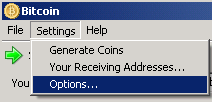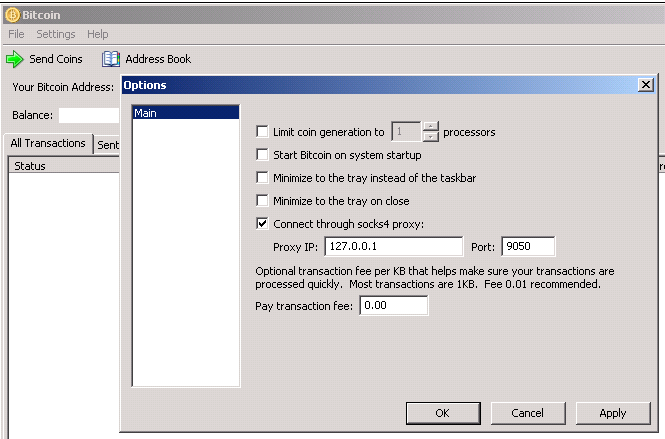Tor: Difference between revisions
Removed stub marker... I guess the page is mostly detailed enough now. |
m →bitcoind: - hey, would we talk? |
||
| Line 17: | Line 17: | ||
Run bitcoind with -proxy=127.0.0.1:9050 (or whatever your SocksPort is). | Run bitcoind with -proxy=127.0.0.1:9050 (or whatever your SocksPort is). | ||
not true for windows users ^^ ? | |||
=Hidden services= | =Hidden services= | ||
Revision as of 20:40, 8 January 2011
Tor is a distributed 'onion' network, that makes it more difficult for an adversary to track any one peer on the network. Tor also is very useful to access the 'uncensored' internet in countries such as China and Iran.
Bitcoin can run easily on the Tor network.
GUI
From Bitcoin client menu select Settings -> Options

Check "Connect through socks 4 proxy" with the address 127.0.0.1 and port 9050 (the Tor default port number)

Configuring an application to use Tor is also called to torify it.
(needs a brief howto here)
Conducting business using bitcoin-otc can be done more anonymously when directly connected to a Freenode IRC hidden service.
bitcoind
Run bitcoind with -proxy=127.0.0.1:9050 (or whatever your SocksPort is).
not true for windows users ^^ ?
Hidden services
These services are running within the tor network. You can connect to them for example using the -connect= parameter to bitcoind. Note that you do not need to use them - tor can also anonymize your normal internet traffic, including bitcoin connections. There are some technical reasons why hidden services may be beneficial, see the tor documentation if you're really interested.
Please add your service here if you run a stable bitcoin node under a tor hidden service.
- iy6ni3wkqazp4ytu.onion